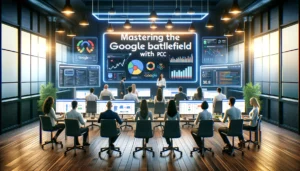SERPs: Mastering the Google Battlefield, A Guide to Dominating SERPs with PPC Advertising

What are the SERPs?
Demystifying the SERPs: Your Gateway to Online Information
The internet is a vast ocean of information, but how do you navigate it effectively? Search engines like Google act as your compass, and the SERP (Search Engine Results Page) is your treasure map.
Every time you enter a search query, the SERP is the page you land on, displaying a curated list of websites that might hold the answer you seek.
These results are a combination of organic listings, earned through a process called Search Engine Optimisation (SEO), and paid advertisements known as Pay-Per-Click (PPC) ads. By understanding the different components of the SERP, you can become a more informed searcher and leverage its power to find exactly what you need online.
Have you ever wanted to conquer the Google battlefield?
We’ve all been there right?!?
You type a question into Google, hit enter, and…bam!
You’re presented with a sea of information.
But what exactly is this page you’ve landed on?
It’s a virtual battleground, a dynamic landscape where websites fight for your attention – the SERP (Search Engine Results Page). This digital frontier holds immense power. Over 90% of online experiences begin with a search engine, making the SERP prime real estate for businesses. It’s where potential customers discover new products, find solutions to problems, and ultimately, make decisions about where to spend their money.
So, how do you conquer this battlefield and ensure your website emerges victorious?
Buckle up, because we’re about to delve into the world of SERPs and PPC (Pay-Per-Click) advertising, the key weapon in your digital arsenal.
Key Takeaways
- Understanding the anatomy of a SERP is crucial for effective PPC advertising.
- Crafting compelling PPC ads involves writing effective ad copy, utilising ad extensions, and creating eye-catching visuals.
- Keyword research and selection are foundational, focusing on high-intent keywords and using tools like Keyword Planner.
- Optimising PPC campaigns through A/B testing, bid management, and improving Quality Scores can significantly enhance performance.
- Leveraging advanced PPC tactics such as remarketing, geo-targeting, and ad scheduling can maximise the impact of your campaigns.
Understanding the Google SERP Landscape
The Anatomy of a SERP
A Search Engine Results Page (SERP) is the page you see after entering a query into Google. It includes a mix of organic results, paid ads, and various SERP features like snippets and local packs. Understanding the layout and components of a SERP is crucial for optimising your PPC campaigns. By analysing the SERP, you can identify gaps in your content or discover new keyword opportunities that competitors might be overlooking.
Why SERPs Matter for PPC
SERPs are constantly changing. While SERP features, paid search results, Google snippets, and pay-per-click (PPC) ads appear by design, it’s the organic results everyone is after. And while most bloggers go after the top 3 spots on a results page, those positions only account for 54% of clicks. SERP page 1, however, takes home over 95% of that traffic. This makes it essential to understand the dynamics of SERPs to effectively place your PPC ads.
Key Metrics to Monitor
To dominate the SERP landscape, you need to keep an eye on several key metrics:
- Click-Through Rate (CTR): Measures the percentage of people who click on your ad after seeing it.
- Quality Score : Google’s rating of the relevance and quality of your keywords and PPC ads.
- Conversion Rate: The percentage of users who complete a desired action after clicking your ad.
- Cost Per Click (CPC): The amount you pay for each click on your ad.
Taking a step back and analysing all of the results on a SERP instead of the top spots can give you a decisive edge over your competition. Looking for signs of low-competition SERPs and figuring out how to dominate a SERP provides a higher-level view of the battlefield and a head start on everyone else.
Crafting Compelling PPC Ads
Writing Effective Ad Copy
Your ad content is more than just filler—it’s the siren call to potential buyers. With continuous refinement based on performance data, you’ll find the sweet spot between attention-grabbing visuals and persuasive text that resonates with shoppers. Your ad copy should be clear, concise, and compelling. Use action-oriented language and highlight unique selling points to capture attention quickly.
Utilising Ad Extensions
Ad extensions are a powerful tool to enhance your PPC ads. They provide additional information and can significantly improve your ad’s visibility and click-through rate. Use site link extensions to direct users to specific pages, call extensions to encourage direct contact, and location extensions to drive foot traffic to your physical store. Leveraging ad extensions can make your ads more informative and engaging.
Creating Eye-Catching Visuals for SERPs
A picture speaks volumes; ensure yours shout ‘quality’. Opt for professional shots that highlight your product’s allure and speak directly to the needs of your audience—crisp, engaging, and telling a story at a glance. High-quality visuals can make your ads stand out in a crowded SERP, drawing the eye and enticing clicks.
In the realm of PPC advertising, the artistry of ad content can make or break your campaign’s success. Let’s dive into crafting ads that not only catch eyes but also captivate minds, leading to those all-important conversions.
Keyword Research and Selection on the SERPs
Keyword research isn’t just important—it’s essential. It connects you to the customer’s voice, revealing the exact phrases they use in their quest for products like yours. When you align your campaigns with these search terms, you’re not just advertising; you’re answering calls from customers who are ready to buy.
Finding High-Intent Keywords
Zero in on those keywords that transform browsers into buyers with precision—think sniper, not a shotgun approach. Use tools like Google’s Keyword Planner to pinpoint these golden phrases. Bid aggressively on high-converting keywords to ensure your ads appear when it matters most.
Using Keyword Planner Tools
Google’s Keyword Planner is a powerhouse for keyword research. It provides a treasure trove of data, helping you identify search volume, competition, and potential cost-per-click. Dive into keyword research with gusto! With each well-chosen term, you pave another pathway leading customers straight to your doorstep.
Long-Tail vs Short-Tail Keywords
Long-tail keywords are often less competitive and more specific, making them ideal for targeting niche markets. Short-tail keywords, while having higher search volumes, are more competitive. Balancing both types in your strategy can maximise your reach and effectiveness.
Embrace the rhythm of continuous optimisation and let your PPC success story unfold!
Optimising Your PPC Campaigns
A/B Testing Strategies
A/B testing is a cornerstone of effective PPC management. By experimenting with different ad copy variations, landing page designs, and targeting options, you can identify what works best for your business. Regularly analyse your campaign data and make data-driven decisions to optimise your PPC campaigns for maximum results. Never settle for mediocrity. Continuously improve your PPC campaigns by testing different headlines, ad copy, and CTAs. Experiment with landing page elements like layouts, forms, and visuals.
Bid Management Techniques
Smart bidding and budget management are critical for PPC success. Automated bidding strategies like Target CPA (Cost per Acquisition) and Maximise Conversions can help you achieve specific goals. Allocate your budget to different campaigns and ad groups, then monitor performance and shift resources to high-performing areas. Use optimised targeting (OT) if your campaign goals are driving towards conversions; OT will enhance your campaign performance.
Quality Score Improvement
Improving your Quality Score is essential for lowering costs and increasing ad visibility. Focus on creating relevant ad copy, optimising landing pages, and ensuring a seamless user experience. Regularly conduct a PPC audit to identify areas for improvement. High Quality Scores can lead to better ad placements and lower CPCs, making your Google ads PPC campaigns more cost-effective.
By implementing these advanced tactics, you can take your PPC campaign to new heights. Remember, PPC advertising is an ever-evolving field, so it’s essential to stay up-to-date with the latest trends, strategies, and technologies to stay ahead of the competition and achieve your marketing goals.
Leveraging Advanced PPC Tactics
Remarketing Strategies
Remarketing is a powerful tactic that allows you to re-engage users who have previously interacted with your website. By targeting these users with tailored ads, you can significantly increase your conversion rates. A well-executed remarketing campaign can turn lost opportunities into valuable customers. Consider segmenting your audience based on their behaviour to deliver more personalised ads.
Geo-Targeting and Local PPC
Geo-targeting enables you to focus your PPC efforts on specific geographic locations. This is particularly beneficial for businesses with a local presence. By honing in on areas where your target audience resides, you can optimise your ad spend and improve ROI. For instance, a London PPC agency can leverage geo-targeting to attract clients specifically in the London area, ensuring that their ads are seen by the most relevant audience.
Ad Scheduling for Maximum Impact
Ad scheduling allows you to display your ads at optimal times when your target audience is most likely to engage. This can be particularly useful for businesses that operate in specific time zones or have peak hours of operation. By analysing your campaign data, you can identify the best times to run your ads and adjust your schedule accordingly. This ensures that your budget is spent efficiently, maximising your campaign’s impact.
By implementing these advanced tactics, you can take your PPC campaign to new heights. Remember, PPC advertising is an ever-evolving field, so it’s essential to stay up-to-date with the latest trends, strategies, and technologies to stay ahead of the competition and achieve your marketing goals.
Analysing and Adapting Your PPC Strategy
Interpreting Analytics Data
Understanding your analytics data is crucial for making informed decisions about your PPC campaigns. Dive deep into metrics like CTR (Click-Through Rate), CPC (Cost Per Click), and conversion rates. Identify trends and patterns that can inform your strategy. Use tools like Google Analytics and Google Ads‘ built-in reporting features to gather insights.
Adjusting Campaigns Based on Performance
Once you have a clear understanding of your data, it’s time to make adjustments. This could involve tweaking your ad copy, changing your bidding strategy, or reallocating your budget. Regularly review your campaigns and make data-driven decisions to optimise performance. Remember, PPC is not a set-it-and-forget-it strategy; continuous optimisation is key.
Staying Updated with PPC Trends
The world of PPC is constantly evolving. Stay ahead of the curve by keeping up with the latest trends and updates. Follow industry blogs, attend webinars, and participate in forums. Implementing new strategies and technologies can give you a competitive edge. Adaptability is crucial for long-term success in PPC advertising.
Regularly analysing and adapting your PPC strategy ensures that you are always moving towards your marketing goals. Stay proactive and make data-driven decisions to maximise your ROI.
Maximising ROI with Google Ads
Budget Allocation Tips
Effective budgeting ensures you’re investing in high-performing keywords and not wasting money on underperforming ones. One of the key factors for scaling up your ad campaigns is to optimise your ad performance and budget. This means that you want to get the most out of every dollar you spend on advertising, and avoid wasting money on ineffective or irrelevant ads. To do this, you need to monitor your ad metrics, such as impressions, clicks, conversions, cost-per-click (CPC), and return on ad spend (ROAS). These metrics will tell you how well your ads are performing, and how much value they are bringing to your business.
Conversion Tracking
Conversion tracking is crucial for understanding the effectiveness of your PPC campaigns. By setting up conversion tracking, you can see which ads, keywords, and campaigns are driving the most valuable actions on your website. This data allows you to make informed decisions about where to allocate your budget and how to optimise your campaigns for better performance. Without conversion tracking, you’re essentially flying blind and making decisions based on guesswork.
Enhancing Landing Page Experience
Your landing page experience plays a significant role in determining your Quality Score and overall ad performance. A well-optimised landing page should be relevant to the ad, load quickly, and provide a seamless user experience. Here are some tips to enhance your landing page experience:
- Ensure your landing page content is highly relevant to the ad copy.
- Optimise for mobile devices to cater to a broader audience.
- Use clear and compelling calls-to-action (CTAs).
- Improve page load speed to reduce bounce rates.
A high-quality landing page not only improves your Quality Score but also increases the likelihood of conversions, thereby maximising your ROI.
By following these expert tips, you can significantly improve your ROI with Google Ads. Whether you’re working with Google ads agencies or conducting a Google ads audit, these strategies will help you make the most of your advertising budget.
Conclusion on the SERPs
Mastering the Google Battlefield with PPC advertising is no small feat, but with the right strategies and tools, it is entirely achievable. From understanding the intricacies of SERPs to leveraging the power of Google Ads, this guide has equipped you with the knowledge to dominate the digital landscape. Remember, the key to success lies in continuous learning and adaptation. Stay updated with the latest trends, refine your keyword strategies, and optimise your ad placements to stay ahead of the competition. With dedication and strategic planning, you can turn every click into a stepping stone towards your business goals. Happy advertising!
Frequently Asked SERPs Questions
What is a SERP?
SERP stands for Search Engine Results Page. It’s the page that displays the results of your search query on a search engine like Google.
Why are SERPs important for PPC advertising?
SERPs are critical for PPC advertising because they are prime real estate where potential customers discover new products, find solutions to problems, and make purchasing decisions.
What is PPC?
PPC stands for Pay-Per-Click, a model of internet marketing where advertisers pay a fee each time one of their ads is clicked. It’s a way of buying visits to your site, rather than attempting to earn those visits organically.
How can I write effective ad copy for PPC?
Effective ad copy should be clear, concise, and compelling. It should include a strong call to action, relevant keywords, and address the needs or problems of your target audience.
What are ad extensions in PPC?
Ad extensions are additional pieces of information that expand your ad to make it more useful to users. They can include phone numbers, additional links, location information, and more.
What is the difference between long-tail and short-tail keywords?
Short-tail keywords are more general search terms with higher search volume but more competition. Long-tail keywords are more specific phrases with lower search volume but less competition, often leading to higher conversion rates.
Author
Search Blog
Free PPC Audit
Subscribe to our Newsletter
The Voices of Our Success: Your Words, Our Pride
Don't just take our word for it. With over 100+ five-star reviews, we let our work-and our satisfied clients-speak for us.
"We have been working with PPC Geeks for around 6 months and have found Mark and the team to be very impressive. Having worked with a few companies in this and similar sectors, I rate PPC Geeks as the strongest I have come across. They have taken time to understand our business, our market and competitors and supported us to devise a strategy to generate business. I value the expertise Mark and his team provide and trust them to make the best recommendations for the long-term."
~ Just Go, Alasdair Anderson





